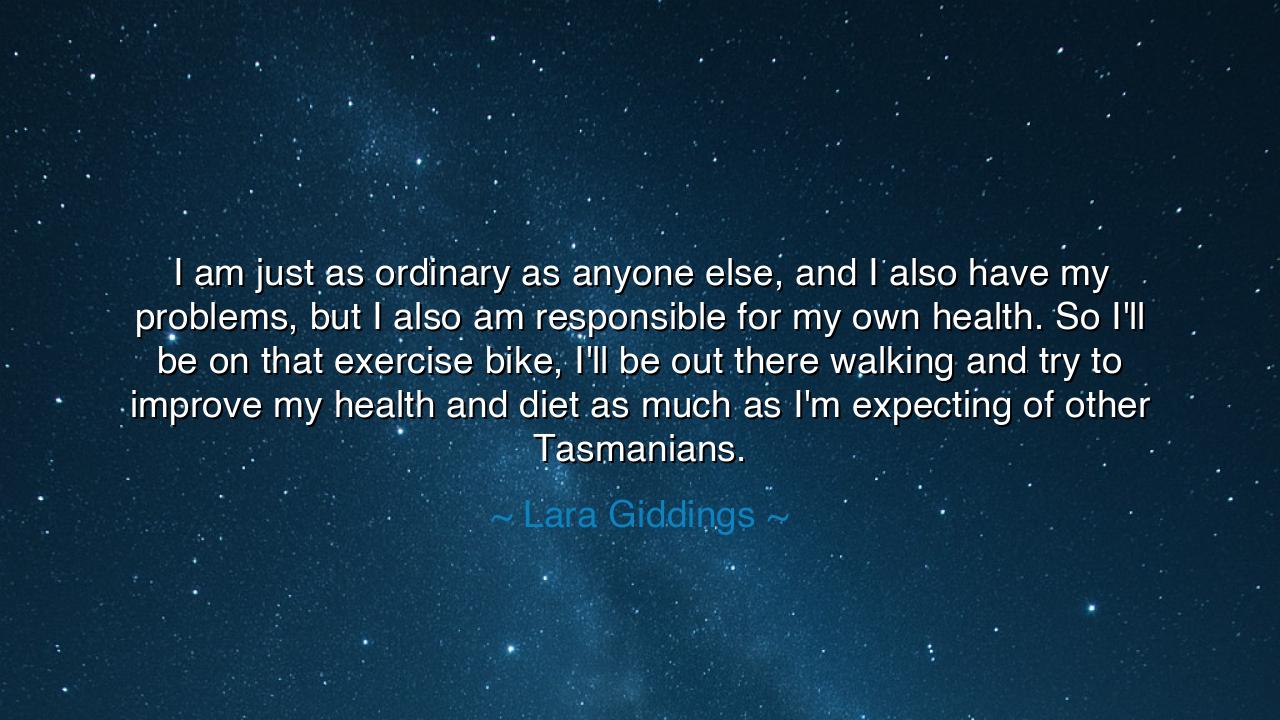
I am just as ordinary as anyone else, and I also have my
I am just as ordinary as anyone else, and I also have my problems, but I also am responsible for my own health. So I'll be on that exercise bike, I'll be out there walking and try to improve my health and diet as much as I'm expecting of other Tasmanians.






In the humble and resolute words of Lara Giddings, former Premier of Tasmania, we hear a truth both noble and universal: “I am just as ordinary as anyone else, and I also have my problems, but I also am responsible for my own health. So I’ll be on that exercise bike, I’ll be out there walking and try to improve my health and diet as much as I’m expecting of other Tasmanians.” Though spoken in the plain language of daily life, her words rise like a beacon of integrity, reminding us that leadership begins not with command, but with example. To guide others, one must first guide oneself; to inspire, one must first embody the discipline one demands of others. Hers is the ancient wisdom of self-accountability — the principle that has shaped the greatest teachers, rulers, and heroes throughout history.
The origin of this quote rests in Giddings’ role as both a public servant and a fellow citizen. At a time when health and wellness were growing public concerns in Tasmania, she spoke not as one above her people, but as one among them. Her words reveal a deep equality of spirit, an acknowledgment that even those who lead are human, flawed, and bound by the same struggles as those they serve. Yet she does not hide behind her humanity as an excuse. Instead, she transforms it into a call to action: “I am responsible for my own health.” In this, she returns to the eternal law of self-mastery — the understanding that no title, wealth, or status can exempt one from the duties of care, discipline, and balance.
The ancients held this truth sacred. Marcus Aurelius, philosopher and emperor, wrote in his Meditations: “Waste no more time arguing about what a good man should be. Be one.” Giddings’ words reflect that same spirit — that virtue is not declared but practiced. To sit upon an exercise bike or to take a walk may seem a simple act, but it is a ritual of accountability, a daily affirmation of discipline over inertia, of will over apathy. Like the Stoics of old, she teaches through example that the greatest ruler is not one who commands armies, but one who conquers the self.
Consider the story of Cincinnatus, the Roman farmer who was called from his plow to lead Rome in a time of crisis. He accepted the role, saved the Republic, and then — when victory was won — returned to his fields. His greatness lay not in his power, but in his humility; he ruled because he served. So, too, does Lara Giddings’ statement carry this timeless ideal: that true leadership is not separation from the people, but solidarity with them. By exercising, eating well, and striving for balance, she does not merely tend to her own health — she fulfills the ancient duty of the leader to model the virtues she asks of others.
Her words also remind us of a deeper truth about responsibility: that no one else can live your life for you. Health, in body and spirit, cannot be delegated. The wise of every age have said that the body is a temple — not because it is flawless, but because it houses the light of consciousness. To care for it is an act of gratitude to life itself. When Giddings declares that she will walk, cycle, and improve her diet, she affirms the eternal principle of stewardship: that each soul is entrusted with a vessel — fragile, fleeting, and sacred — and must preserve it with diligence and respect.
Yet, in her humility, she also speaks to compassion. “I am just as ordinary as anyone else,” she says — not as apology, but as solidarity. This acknowledgment bridges the distance between leader and people, reminding us that all share the same trials — fatigue, temptation, discouragement. And in that shared humanity lies the seed of hope: if one person can rise to meet their own responsibilities, so can another. Collective strength begins with individual discipline, and the well-being of a society depends on the honesty of its members with themselves.
So, my child of the future, take this teaching to heart. Do not wait for others to change before you do. Whether in health, work, or spirit, begin with yourself. Walk when the world would sit; choose nourishment over indulgence; build consistency over comfort. For in caring for your body, you are not merely preserving life — you are honoring the divine order that gave it to you. And when you do so with humility, you become a quiet example to others, as Lara Giddings became to her people.
The wisdom of her words is eternal: that responsibility is the highest form of leadership, and that greatness begins not in the halls of power, but in the small, daily acts of integrity. To lead is to live in truth — to expect of yourself what you would ask of others. Be therefore both humble and steadfast, tending the garden of your body and soul, that through your example, others may remember their own strength. For in the end, every civilization stands or falls not by its rulers, but by the discipline and virtue of its citizens — those who, like Giddings, understand that true change begins with the self.






AAdministratorAdministrator
Welcome, honored guests. Please leave a comment, we will respond soon